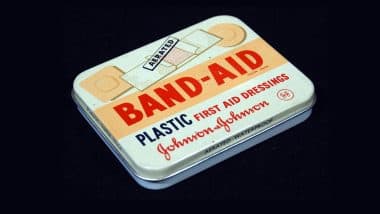Mumbai, April 4: Are the bandages we trust to protect our wounds inadvertently putting us at risk of cancer? A recent study conducted by environmental watchdogs has unearthed unsettling findings, revealing that some of the most trusted brands in bandages, including the ubiquitous Band-Aid by Johnson & Johnson, may contain alarming levels of cancer-causing forever chemicals.
Testing conducted by Mamavation, in collaboration with Environmental Health News, examined 40 bandages from 18 different brands commonly found in medicine cabinets nationwide. Shockingly, detectable levels of the chemical fluorine were found in 26 of these bandages, raising significant concerns about potential health risks associated with their usage. Fluorine, a key component of per- and polyfluoroalkyl substances (PFAS), is known for its resilience and longevity in the environment. AI in Healthcare: British Researchers Develop New Artificial Intelligence Tool To Predict Fatal Heart Rhythm With 80% Accuracy.
Impact of PFAS
While these chemicals are sometimes used in the manufacturing process of adhesives found in bandages, their presence in products intended for direct contact with open wounds is deeply troubling. Dr Linda Birnbaum, a prominent toxicologist involved in the study, expressed alarm at the implications of these findings. Not only can PFAS chemicals like fluorine lead to skin burns and eye damage, but they also pose a more insidious threat when absorbed into the bloodstream. Once in the body, PFAS can wreak havoc on vital organs such as the liver, kidneys, and immune system, potentially increasing the risk of cancer and other serious health conditions. World Autism Awareness Day 2024 Date, Theme and Significance: What Is Autism Spectrum Disorder (ASD)? Everything You Need To Know the Day.
The brands implicated in the study include household names like Band-Aid by Johnson & Johnson, Curad, CVS Health, and Equate, among others. Surprisingly, even bandages marketed as antibacterial or designed for sensitive skin were found to contain concerning levels of PFAS. The presence of PFAS in everyday consumer products is not a new revelation. From menstrual products to fast food packaging, these chemicals have infiltrated numerous facets of our lives, raising questions about their widespread use and potential health impacts.
In light of these alarming findings, there is a pressing need for greater transparency and regulation in the manufacturing of consumer goods. Consumers must be empowered with knowledge about the potential risks associated with everyday products, allowing them to make informed choices to safeguard their health and well-being.
(The above story first appeared on LatestLY on Apr 04, 2024 11:59 AM IST. For more news and updates on politics, world, sports, entertainment and lifestyle, log on to our website latestly.com).













 Quickly
Quickly


